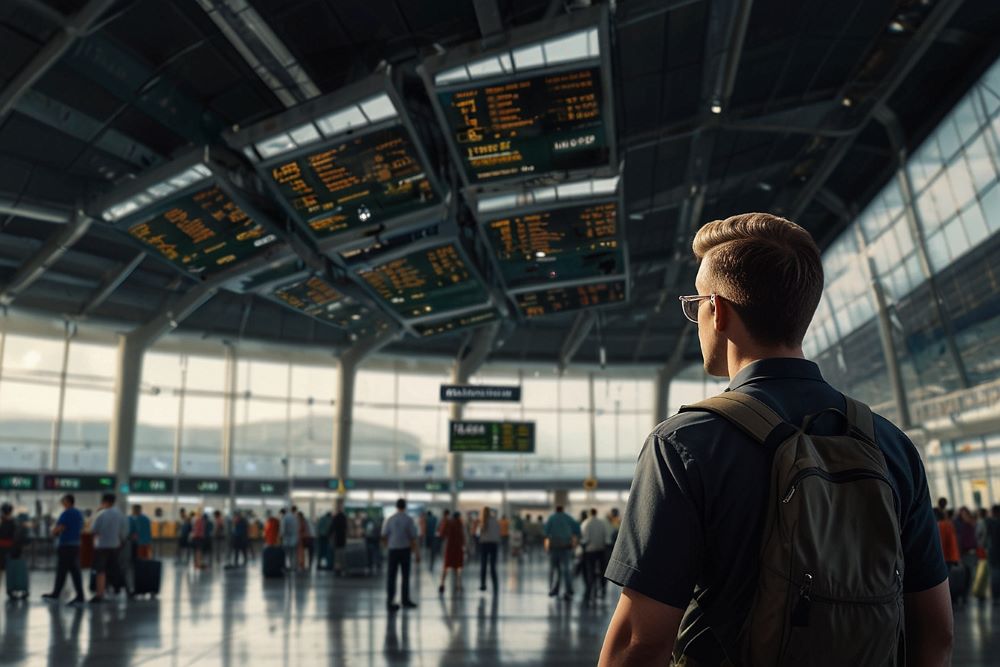Published on November 28, 2025
Thousands of travelers across the United States are facing significant disruptions today as major airlines, including United, Delta, American, PSA, SkyWest, and others, suffer 1,039 delays and 51 cancellations. This has particularly affected key airports in Chicago, New York, Miami, Atlanta, Detroit, Boston, Honolulu and others. These airports are among the busiest in the U.S., making the travel chaos even more challenging for passengers. The disruptions come as a strong winter storm moves through the Midwest and Great Lakes region, bringing cold, snowy conditions that have already caused significant delays, particularly in northern states.
With 82 million Americans traveling for Thanksgiving, the storm’s impact, combined with lingering staffing shortages from the recent government shutdown, is adding to the travel mayhem. Passengers are urged to stay updated on flight statuses and check with their airlines for the latest information.
Advertisement
Reason for Disruptions: Severe Weather and Thanksgiving Travel Surge
Advertisement
The ongoing travel disruptions across the U.S. are largely driven by a powerful winter storm that is sweeping through parts of the Midwest and the Great Lakes region. As an estimated 82 million Americans head out to celebrate Thanksgiving, the storm has brought cold, snowy conditions that are severely impacting travel. On Thursday morning alone, more than 800 flights had already been delayed, with the northern states bearing the brunt of the storm’s impact.
While some delays were anticipated, the situation has been made worse by lingering effects from the government shutdown, which had already led to staffing shortages at airports. Despite these challenges, airports had mostly recovered from the shutdown, but this latest storm has added additional pressure.
Advertisement
Advertisement
According to the National Weather Service, parts of Iowa, Minnesota, Wisconsin, and Michigan are expecting 6 to 10 inches of snow, beginning Friday afternoon and continuing into Saturday evening. This inclement weather is expected to cause further delays and cancellations, particularly in Chicago, Detroit, and other nearby hubs.
U.S. Airports Hit Hard by Delays and Cancellations
The airports most severely affected by these disruptions include some of the busiest hubs in the country. The data shows that airports such as Chicago O’Hare Intl (ORD), Newark Liberty Intl (EWR), and John F. Kennedy Intl (JFK) are experiencing the highest number of delays and cancellations. These airports handle a large volume of both domestic and international traffic, making them critical points of entry for travelers.
Advertisement
- Chicago O’Hare Intl leads the list with 9 cancellations and 131 delays. The airport, located in the heart of the Midwest, is a key transfer hub for connecting flights. The high volume of disruptions here highlights the strain on one of the largest and most crucial airports in the U.S.
- Newark Liberty Intl in New Jersey is also facing significant disruptions with 8 cancellations and 45 delays. As a major gateway to New York, disruptions here are felt across the region, affecting travelers heading in and out of the city’s metropolitan area.
- John F. Kennedy Intl in New York is experiencing 5 cancellations and 69 delays, with the delays impacting not just domestic travelers but also international passengers connecting through the airport.
Advertisement
Other airports that are feeling the effects of the disruptions include Miami Intl (MIA), with 4 cancellations and 85 delays, and Hartsfield-Jackson Intl (ATL) in Atlanta, which is a key hub in the South with 2 cancellations and 47 delays.
Affected Airports and Cities: Where Are Travelers Struggling the Most?
From the data provided, it is clear that the cities and airports facing the most strain today include those with high air traffic and a significant number of connecting flights.
- Chicago (ORD) and New York (JFK, EWR) are experiencing widespread delays, creating ripple effects across the Northeast and Midwest. These cities are major centers for both domestic and international flights, so any disruptions here are likely to cause significant delays across multiple regions.
- Miami (MIA), Atlanta (ATL), and Detroit (DTW) are also key airports seeing a moderate number of delays and cancellations. While these airports may not have as many cancellations as Chicago or Newark, the delays could still create long waits for passengers heading out of these cities.
- Boston (BOS) and Honolulu (HNL) are seeing fewer disruptions but still face challenges, with Boston Logan Intl reporting 2 cancellations and 19 delays, while Daniel K Inouye Intl in Honolulu has experienced 2 cancellations and 14 delays.
Affected Airlines: Which Carriers Are Impacted the Most?
The ongoing disruptions are affecting several major U.S. airlines, particularly those operating in the busiest hubs. Airlines such as United Airlines, Delta Air Lines, and American Airlines are experiencing delays and cancellations due to the high volume of traffic and operational challenges at key airports like Chicago O’Hare, Newark Liberty, and John F. Kennedy.
Regional carriers such as Envoy Air and PSA Airlines, both affiliated with American Airlines, along with Endeavor Air (a Delta Air Lines regional carrier), are also impacted by delays and cancellations. SkyWest, which operates flights for multiple airlines including United, Delta, American, and Alaska, is feeling the strain as well.
Other airlines like JetBlue, Alaska Airlines, and Hawaiian Airlines are also experiencing disruptions, though the extent may vary depending on their flight routes and hubs. Passengers traveling with these carriers should monitor their flight statuses closely for any changes.
What Affected Passengers Can Do Now
If you’re among the travelers impacted by today’s disruptions, there are several steps you can take to minimize the frustration:
- Stay Updated on Flight Status: Airlines are updating flight statuses regularly, so it’s essential to keep checking for real-time updates. Many airlines provide text notifications or apps that send alerts on changes to flight schedules.
- Consider Alternate Routes or Airports: If you’re facing significant delays, it may be worth exploring alternate airports or routes. Many large cities have more than one airport, and some regional airports may offer quicker routes to your destination.
- Contact Your Airline: For passengers whose flights are canceled, it’s essential to contact the airline directly to understand rebooking options. In some cases, airlines may offer alternative flights or accommodations for affected travelers.
- Prepare for Longer Wait Times: Given the number of delays and cancellations across U.S. airports, passengers should prepare for longer waits at the airport. Make sure to have a backup plan for food and entertainment, especially for families and children traveling.
- Know Your Rights: If your flight is delayed or canceled due to airline-related issues, you may be entitled to compensation, such as meal vouchers or hotel accommodations. Check your airline’s policies to understand your rights in these situations.
Conclusion
With 1,039 delays and 51 cancellations affecting airports across the United States today, travelers are facing significant challenges. Major hubs such as Chicago O’Hare, Newark Liberty, and John F. Kennedy are experiencing the highest number of disruptions, impacting thousands of passengers. Whether you’re flying domestically or internationally, staying informed and flexible is key to navigating today’s travel woes. Always stay in close contact with your airline and consider alternate routes to avoid further delays. With patience and proactive planning, you can minimize the impact of these disruptions.
Source: FlightAware and Affected Airports, CNN
Advertisement
Advertisement
Tags: cancellations, Flight Delays, Thanksgiving travel, U.S. Airports, winter storm
Subscribe to our Newsletters
I want to receive travel news and trade event updates from Travel And Tour World. I have read Travel And Tour World's Privacy Notice .
Friday, November 28, 2025
Friday, November 28, 2025
Friday, November 28, 2025
Friday, November 28, 2025
Thursday, November 27, 2025
Thursday, November 27, 2025
Friday, November 28, 2025
Thursday, November 27, 2025




